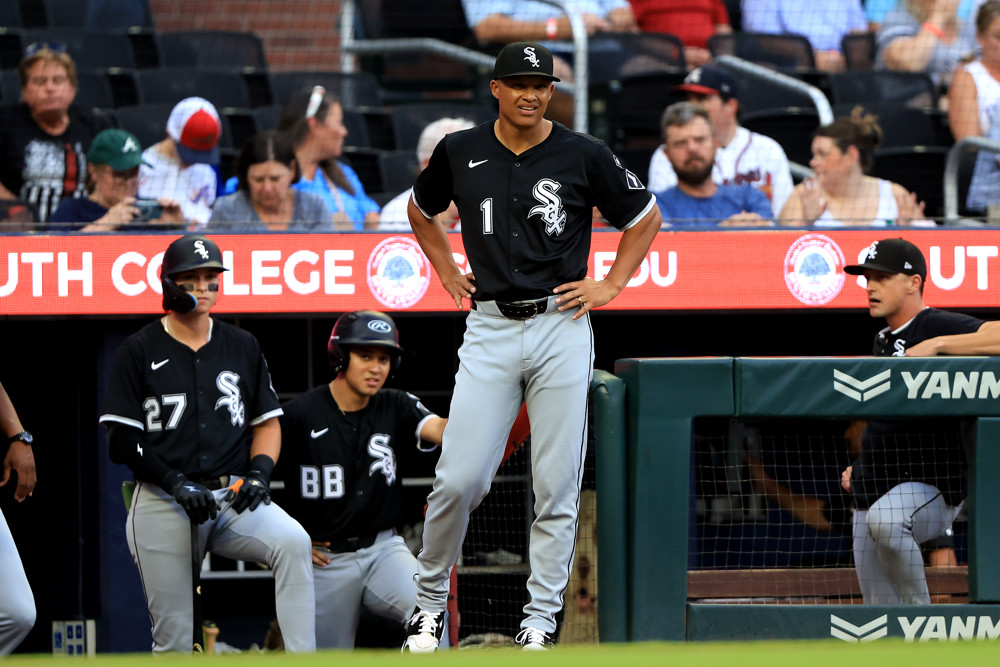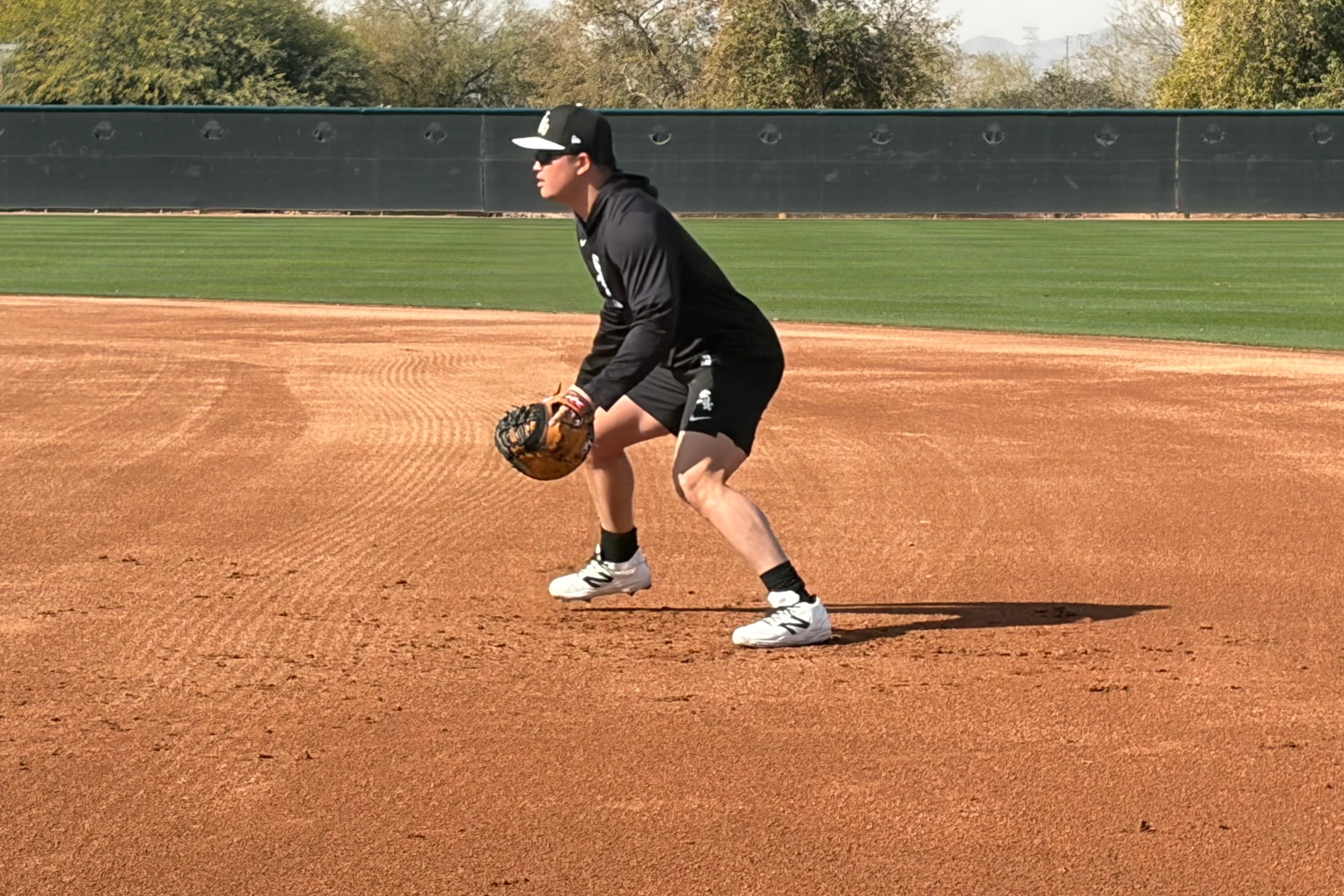There was a more innocuous example midway through the season, where Chase Meidroth and Mike Tauchman flipped spots at the top of the batting order seemingly without a precipitating cause, or a more pointed moment in early May when the White Sox beat worked up to nerve to ask what the story was with Joshua Palacios -- cut by the Pirates at the end of spring training -- repeatedly batting in the middle of the lineup.
In each case, White Sox manager Will Venable conceded he didn't really know.
Not in the sense he was confused by it, but that the research behind discerning who were the best available options against right-handed pitching or the ideal lineup ordering had been outsourced to a different member of the staff. There are always extra considerations to which the manager is only privy, medical and workload concerns, etc. But when it came to this specific work of valuing and ranking the available lineup options, Venable felt his job was more to trust the information than understand it, and any quote he could offer would boil down to the idea that he was told it was the right move.
"In a lot of these areas, we just have people who are a lot smarter than me doing work on this stuff, they're in the weeds on this stuff," Venable said. "We know how this is all being made and we know how we're arriving to these answers. Once you get that set up, you can tap into those different pockets of information and trust that you're getting good stuff."
Loyal readers will know that the White Sox getting their analytics research to the point of trusting they're distributing good stuff to the coaching staff is more than a notion, but that was last year's excuse for why internal optimism reigned even amid worst-in-the-league on-field results. As Venable works to migrate a collection of promising youngsters and serviceable vets into a reliably competitive outfit and strikes a similar tune of being encouraged while being disappointed by a 60-102 record, he wants all his charges to be equally untroubled by details it's not their job to worry about.
"When you're around players as a coach, you realize they all think really differently," Venable said. "To really hit home the important points, you really have to find one thing to anchor to and let them fill in the gaps with their own perspective and creativity and how they fill in certain things."
"Will's biggest thing is not over-complicating matters," said bench coach Walker McKinven. "If you're focused on too many different things, in the end you're probably focused on nothing, really."
To this end, the post-All-Star break surge of the White Sox offense reversing their season-long struggles against fastballs was a proof-of-concept moment, preceded by several weeks of Venable privately and publicly harping on it as the central issue behind their meager production. Colson Montgomery's swing reaches lightning speed over a longer path, while Meidroth's is both shorter and slower, and both they and every Sox hitter in between them was tasked with finding their own path to the same central objective of getting on time for the heater. Venable's joyous shout of "Way to sweep 'em boys!" into the coaches room at the end of July's rout of the Pirates, with a little profanity mixed in for effect, remains the most fired up any member of the White Sox beat has seen the even-keeled manager.
There were some other "very simple metrics in different parts of our gameplay," that didn't achieve the same publicity for Sox, and the steady mentions of pre-pitch setups and secondary leads provide as clear of examples of success. But as Venable enters the preparation for a follow-up season, where he is primed to have influence in filling a larger and more impactful slate of staff positions than when he was first hired, he's seeking ways to lean further into his central project.
"We're committed to using those anchors throughout the season to measure our progress," Venable said. "Through that, even, I realized these 'one things' in each department [we focused on], that there's an even simpler version of that. How we're going about it now in our messaging is simpler than the beginning of the season and I think, more impactful."
The 2025 White Sox season brought the necessity of a simple message to the forefront simply by way of their constant roster churn, where 62 players used was a step down from the year before. The team's central principles, non-negotiables for preparation, or even just the signs they use on the field, had to be communicated effectively to new people many, many times over. It wasn't out of the ordinary to McKinven, who hails from a Brewers organization that's accustomed to shuffling through options, and banking on their ability to out-perform the competition with players No. 11 through 50 on their depth chart, even in matchups where they look outclassed by the top names involved.
With the way their payrolls have looked and project to look going forward, with Venable acknowledging that "the type of team you are obviously is largely based on your personnel," or that simply the '25 club made heavy use of Brewers cast-offs, even future -- and better -- White Sox teams could have a similar look.
If one of the benefits of having McKinven on staff is that he has a view of what such an operation needs to look like, it's notable they immediately aligned on Venable's central mission of streamlining the message to players and addressing areas of the team where "things felt scattered" by the bench coach's description. From the outside, if one of the benefits of the McKinven-Venable dynamic is that it's now one of the few present examples of the division of labor that figures to define the Sox coaching staff going forward, it's notable that Venable seems to take the role of providing the more digestible version of the message in a lot of his relationships.
"I can be a little bit harsher and not mince words with people, and Will's one of the nicer human beings I've ever met," McKinven said with a laugh. "In that way, we offset each other a little bit."
"The things he is really thoughtful about are things that don't come to mind as naturally for me, and certainly in-game stuff he's really analytical and has a really developed strategic mind," Venable said. "He's a really smart guy, which also complements me and my ability to connect with the guys and have those kinds of skills, along with his ability to help us navigate and think about players in objective ways. I think it's a great fit."
Venable's personable nature outwardly makes his managerial career a challenge to Hall of Fame manager Leo Durocher's famous, but paraphrased quote that "nice guys finish last," which he extends to his roster as a whole. The last few minutes of this interview spiraled into him brainstorming examples to demonstrate that the 2025 White Sox were actually composed of nice people in a way that would break through to an audience that had heard similar lines a thousand times before, even about chaotic clubhouses. That the Washington Nationals clubhouse attendants weren't the first such group to praise his team's comportment without prompting, was the example at the top of Venable's mind at the time.
But in monitoring how he communicated over his first year, Venable seems more aimed at countering the Durocher line of "Baseball is like church; many attend, few understand." This line is of course, still true, as is apparent when Brian Bannister is walking through his theory that barrel-chested pitchers have fastballs that play up because they can hide the ball longer in their delivery, or when Ryan Fuller is discussing Caleb Bonemer's attack angle adjustments.
But just like with Venable making data-informed tweaks to his lineup, knowledge of every intricacy behind every play shouldn't be an impenetrable barrier to understanding the basics of the plan; neither for fans, nor for players who prefer to think more in terms of "stay on the fastball," or "get ahead in the count," or "see ball, hit ball." Even in the morass of modern baseball and the high-powered research and instruction that pushes it into new realms everyday, there are some simple things the White Sox need to do to be successful that everyone should be able to monitor, to track, to feel. The clearer they are, the less need for mincing words when they fall short or screw up.
"I haven't talked to anybody about my media comments," Venable said. "No player has ever said to me 'Why did you say that about me in the media?', and I've never said anything in the media in which I've been concerned that a player would think poorly of me for honesty about a mistake that's made. I think they all know me well enough that I'm not going to say anything bad about them or crush them for anything. And when you make a mistake, you make a mistake. Everyone sees it, we talk about it and move on."
As someone who has been following the White Sox for a nine-year period that seemed to be as tumultuous as anyone would want to experience, Venable's approach to talking about on-field screwups was intriguing. We're in the intervening weeks of him overhauling even seemingly functional portions of his coaching staff for alternatives that will theoretically better fit the future vision of the White Sox, and have yet to see how he manages a team with a scintilla of hope to contend. But Venable's underlying principle in talking about the White Sox is rooted in a simple direct concept that could never fully be assumed in the past.
"I guess my approach is this thing happened," Venable said. "I mean, we all saw it, right?"






